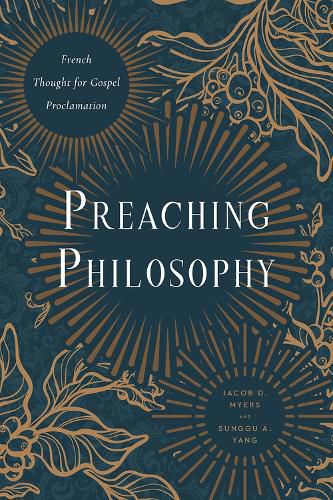Readings Newsletter
Become a Readings Member to make your shopping experience even easier.
Sign in or sign up for free!
You’re not far away from qualifying for FREE standard shipping within Australia
You’ve qualified for FREE standard shipping within Australia
The cart is loading…






Philosophy preaches, and the pulpit preaches philosophy. As with all guilds, homiletics orients itself around a canon that constitutes its ways of being, behaving, and belonging. Part of the process of becoming a homiletician entails demonstrating one's mastery of certain concepts and texts. Doctoral research in homiletics maintains its disciplinary boundaries by requiring students to demonstrate familiarity with and understanding of those authors who have established the "proper" methods and modalities of preaching.In Preaching Philosophy, Jacob D. Myers and Sunggu A. Yang stage an intervention at this foundational pedagogical site by challenging the philosophical assumptions operative in the works of a selection of canonical characters and texts in the field of homiletics. The book arises from the conviction that critical homiletical scholarship must extend beyond those authors and texts that predominate preaching syllabi in North American seminaries and divinity schools. Furthermore, Myers and Yang argue that it is not enough to challenge another's wisdom on how to preach faithful and effective sermons. Rather, one must also discern and question the a priori assumptions undergirding said wisdom. This is precisely what Preaching Philosophy seeks to do: to trouble the philosophical assumptions presupposed by foundational figures in homiletics.
Much homiletical theory prior to the 1960s arises from Kantian convictions about the limits of human rationality vis-a-vis the divine. As traditional, deductive preaching styles made way for the inductive logics constituting the New Homiletic, Heidegger and Kierkegaard came to supplant Kant's long ascendancy by shifting attention to the role of discourse in sermonic reception. Building on this foundational shift, Preaching Philosophy looks to francophone theorists from the second half of the twentieth century to intervene in how we conceptualize homiletical theories and theologies. Each chapter stages a critical encounter between a foundational homiletician and a French philosopher in hope of introducing new concepts and angles of critique into homiletical scholarship.
$9.00 standard shipping within Australia
FREE standard shipping within Australia for orders over $100.00
Express & International shipping calculated at checkout
Philosophy preaches, and the pulpit preaches philosophy. As with all guilds, homiletics orients itself around a canon that constitutes its ways of being, behaving, and belonging. Part of the process of becoming a homiletician entails demonstrating one's mastery of certain concepts and texts. Doctoral research in homiletics maintains its disciplinary boundaries by requiring students to demonstrate familiarity with and understanding of those authors who have established the "proper" methods and modalities of preaching.In Preaching Philosophy, Jacob D. Myers and Sunggu A. Yang stage an intervention at this foundational pedagogical site by challenging the philosophical assumptions operative in the works of a selection of canonical characters and texts in the field of homiletics. The book arises from the conviction that critical homiletical scholarship must extend beyond those authors and texts that predominate preaching syllabi in North American seminaries and divinity schools. Furthermore, Myers and Yang argue that it is not enough to challenge another's wisdom on how to preach faithful and effective sermons. Rather, one must also discern and question the a priori assumptions undergirding said wisdom. This is precisely what Preaching Philosophy seeks to do: to trouble the philosophical assumptions presupposed by foundational figures in homiletics.
Much homiletical theory prior to the 1960s arises from Kantian convictions about the limits of human rationality vis-a-vis the divine. As traditional, deductive preaching styles made way for the inductive logics constituting the New Homiletic, Heidegger and Kierkegaard came to supplant Kant's long ascendancy by shifting attention to the role of discourse in sermonic reception. Building on this foundational shift, Preaching Philosophy looks to francophone theorists from the second half of the twentieth century to intervene in how we conceptualize homiletical theories and theologies. Each chapter stages a critical encounter between a foundational homiletician and a French philosopher in hope of introducing new concepts and angles of critique into homiletical scholarship.